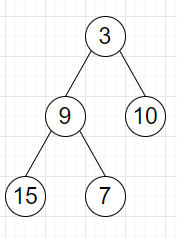
 Data Structure
Data Structure Networking
Networking RDBMS
RDBMS Operating System
Operating System Java
Java MS Excel
MS Excel iOS
iOS HTML
HTML CSS
CSS Android
Android Python
Python C Programming
C Programming C++
C++ C#
C# MongoDB
MongoDB MySQL
MySQL Javascript
Javascript PHP
PHP
- Selected Reading
- UPSC IAS Exams Notes
- Developer's Best Practices
- Questions and Answers
- Effective Resume Writing
- HR Interview Questions
- Computer Glossary
- Who is Who
Program to find sum of the right leaves of a binary tree in C++
Suppose we have a binary tree we have to find the sum of all right leaves in a given binary tree.
So, if the input is like

then the output will be 17, as there are two right leaves in the binary tree, with values 7 and 10 respectively.
To solve this, we will follow these steps −
Define a function dfs(), this will take node, add,
-
if node is null, then −
return
-
if left of node is null and right of node is null and add is non-zero, then −
ret := ret + val of node
dfs(left of node, false)
dfs(right of node, true)
From the main method, do the following −
ret := 0
dfs(root, true)
return ret
Let us see the following implementation to get better understanding −
Example
#include <bits/stdc++.h>
using namespace std;
class TreeNode{
public:
int val;
TreeNode *left, *right;
TreeNode(int data){
val = data;
left = NULL;
right = NULL;
}
};
class Solution {
public:
int ret = 0;
void dfs(TreeNode* node, bool add){
if(!node)
return ;
if(!node−>left && !node->right && add){
ret += node−>val;
}
dfs(node−>left, false);
dfs(node−>right, true);
}
int solve(TreeNode* root) {
ret = 0;
dfs(root, true);
return ret;
}
};
main(){
Solution ob;
TreeNode *root = new TreeNode(3);
root−>left = new TreeNode(9);
root−>right = new TreeNode(10);
root−>left−>left = new TreeNode(15);
root−>left−>right = new TreeNode(7);
cout << (ob.solve(root));
}
Input
TreeNode *root = new TreeNode(3); root−>left = new TreeNode(9); root−>right = new TreeNode(10); root−>left−>left = new TreeNode(15); root−>left−>right = new TreeNode(7);
Output
17

Advertisements
